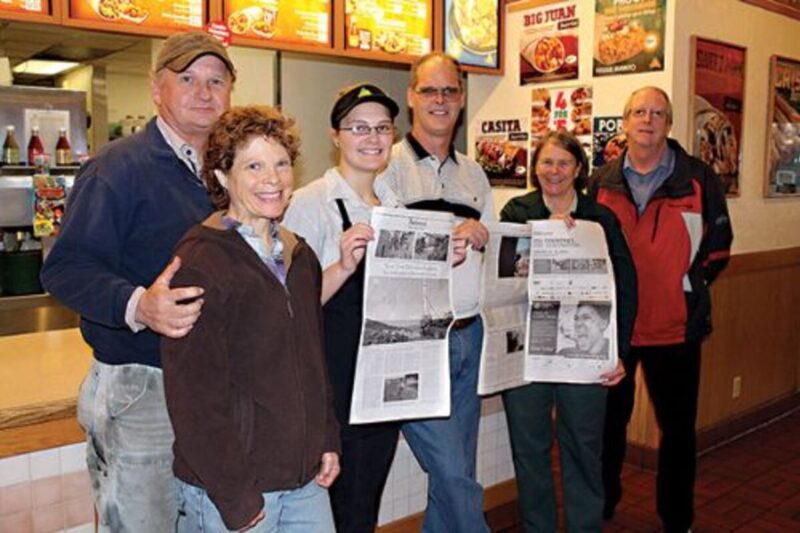Sean C. Morgan
Sweet Home was front and center on the National Page of The New York Times on Sunday, Nov. 16, in an article focusing on how the shutdown of much of the local logging industry over the past 25 years has impacted the community.
The story, by the Times’ Seattle Bureau Chief Kirk Johnson, focuses on how the virtual cessation of logging in the Willamette National Forest, which once, Johnson notes, “produced more wood than any other national forest in the country,” has impacted rural communities in Oregon.
He chronicles the inflow of low-income residents who, he says, filled the gap left by loggers who moved on to find other work and places to live, and by retirees.
One of a series the Times has been running on “American hardship 50 years after the War on Poverty,” the story goes into some detail about how Sweet Home has responded to the challenges created by those changing demographics, particularly the poverty, with detailed descriptions of the work performed by Sweet Home Emergency Ministries (SHEM) and of life for some families living in poverty.
Local residents whose voices appear in the article include Candalynn Johnson, a Sweet Home High School graduate who was a member of the the 2012 Sportsman’s Holiday Court and whose family lives in a local trailer park, Craig Martin, who grew up in Sweet Home before graduating from college and returning to serve as one of the longest-tenured city managers the city has had, and SHEM Director Cindy Rice and her husband Dan, who runs a family-owned logging business.
“It was interesting to talk to them,” said Dan Rice. “Wasn’t much different than talking to Alex (Paul, former The New Era publisher and currently a reporter at the Democrat-Herald).”
Johnson, the writer, didn’t have any background in logging at all, Rice said. Talking about his grandfather, Rice mentioned “misery whips,” and the reference went right over Johnson’s head. A misery whip is a two-handed saw.
Johnson did “pretty well” capturing what has happened in Sweet Home, Rice said, recalling how he went to work in the woods to put himself through college and then ended up taking over the family business just to keep it going.
But it will be his college electrical engineering degree that will allow him to retire someday, he said.
Rice complimented the headline: “Town that thrived on logging is looking for a second growth.”
“That’s a very good headline,” Rice said, something New Yorkers might not get, but accurate in relation to Sweet Home.
The Times story presents a picture of how the spotted owl fallout has affected Sweet Home and how the best promise for the future appears to continue to be the privately owned and public forests surrounding the city – logging on a smaller scale and, more importantly, tourism.
Johnson made multiple visits to Sweet Home, though local people he talked with are not sure how often he came. He brought a photographer and videographer along on some trips.
“It was really fun,” said Candalynn Johnson. “They (the reporter and photographer) both were really excited, and it was really interesting to see the struggles in small towns in Oregon show up in a place like New York.”
Local sources for the article said they thought Kirk Johnson provided an accurate account of at least one side of Sweet Home, though they have heard criticism from others who have seen it.
“There’s a few people concerned about the article in viewing Sweet Home in too much a desolate and dead way,” Candalynn Johnson said.
“It’s the reality,” she said of what the story depicted, something echoed by her father and Martin.
It is rough for many to make it in today’s Sweet Home, she said.
Johnson points to the large number of children participating in the Food Pak program and qualifying for free lunch at school.
“You don’t have a family member working or a friend, you can’t get a job here,” she said.
“I think this is an important line of stories they’re doing,” said her father, Charles Johnson, referring to the assessment of President Johnson’s War on Poverty.
“The intentions are one thing, but what are the results?” Johnson asked. If it’s not working, “what are we doing instead of more of the same?”
“He did one angle of (Sweet Home),” he said. Sweet Home has more to its story.
“It’s not as simple as just the government timber getting locked up,” Rice said.
“You get the things you get in any small town – that you don’t get in a place like New York,”
Charles Johnson said. It’s people pulling together, and it makes survival easier.
The Times people came across as sincerely interested, Martin said.
Community leaders with whom Kirk Johnson spoke say he apparently decided to focus on Sweet Home largely because he saw something unique in the town and its people – particularly the efforts to establish a community forest and develop industries that are not directly tied to traditional logging.
The community realizes things won’t be the way they used to be, Martin said, but the community still has attractive qualities. Those are why he personally wanted to move back to Sweet Home: It’s a quality small town with good recreation, and he is fortunate to be able to have a job in Sweet Home.
Martin’s goal is to create opportunities for youths growing up and graduating here, so they can find jobs, make a living and stay if they want to stay.
“The reason they found us is because what we’re doing here is different,” he said. “We’re trying to reconnect the community to the forest in a different way, to still create some economic benefit.”
– Scott Swanson contributed to this article.





